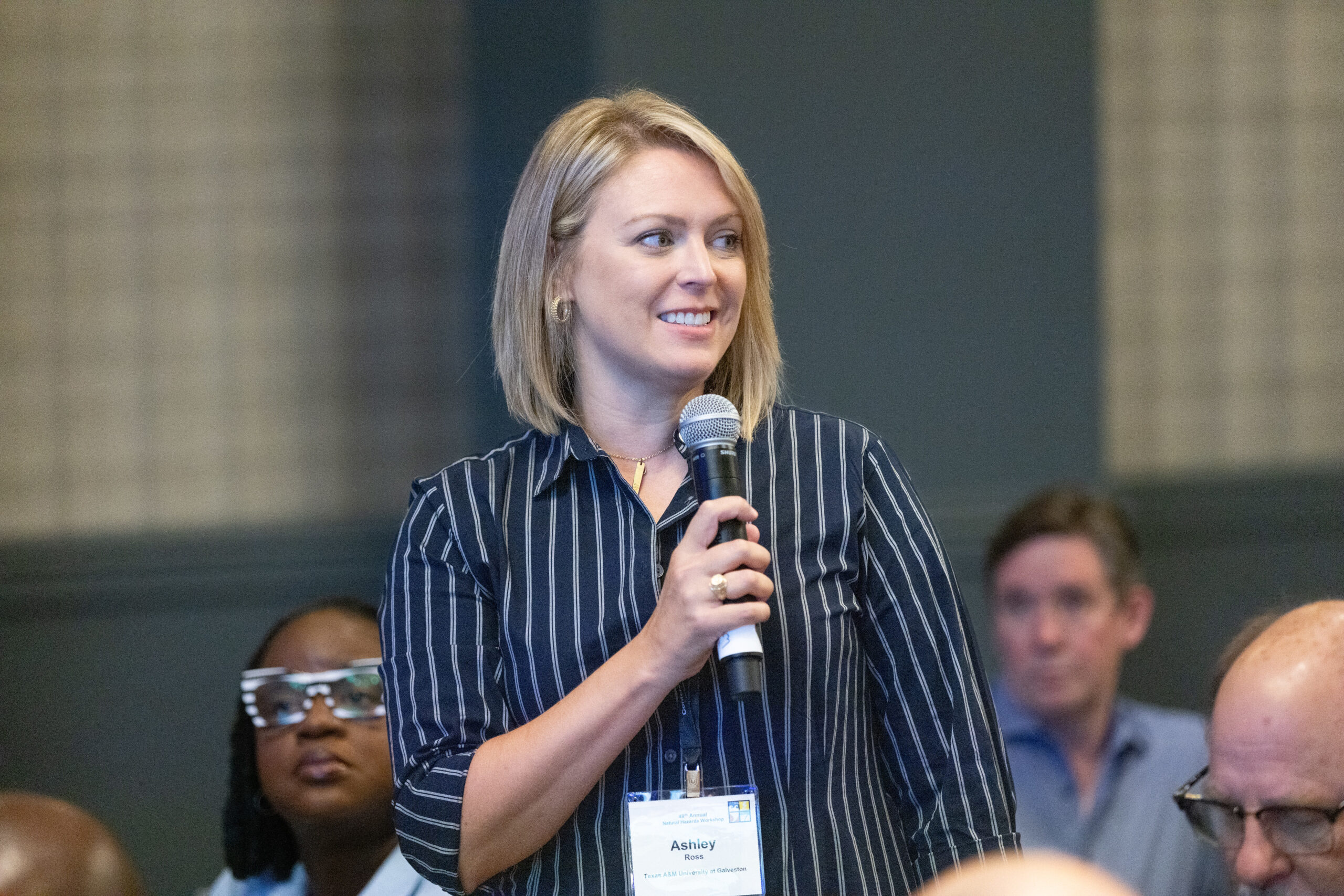Dr. Ashley Ross Makes Strides In Community Resilience
 Ross at the Natural Hazards Workshop in July 2024. Photo credit: Van Zandt Visual
Ross at the Natural Hazards Workshop in July 2024. Photo credit: Van Zandt Visual Dr. Ashley Ross ’03, ’10 is dedicated to safeguarding communities in the face of disaster. The Department of Marine and Coastal Environmental Science professor’s work, situated at the intersection of community resilience and social identity, explores how people react to disasters and what informs those behaviors and attitudes. Her interdisciplinary approach to understanding resilience in the face of disaster serves the Texas coast and far beyond.
Ross’ path in academia has not been linear. Her doctoral research focused on Latin American comparative politics, with dissertation fieldwork leading her to Mexico, where she studied the local governments and democratic quality at a time when the country faced escalating violence. Ross felt compelled to make a significant career shift when the BP Deepwater Horizon explosion killed 11 workers and released 134 million gallons of oil into the ocean, choosing instead to focus on local governments and environmental hazards in the U.S.
“Changing my field of study was challenging,” Ross admitted. “I basically had to write a new dissertation and learn a whole new body of literature. Sometimes, I wondered if I had made a bad decision,” she said. “But early on, I received institutional support that provided not only grant funding but also mentorship of foundational scholars in the field. They helped guide my thinking and understanding of the interdisciplinary scholarly space of hazards and disasters, significantly influencing the trajectory of my own research.”
In 2016, Ross left a tenure-track position in a political science department at another university to join the Department of Marine and Coastal Environmental Science at Texas A&M University at Galveston. This pivot also allowed her to be more involved in graduate programs. She teaches graduate-level classes in environmental management and environmental conflict resolution and leads several directed studies focused on coastal governance with local organizational partners. Ross, an Aggie herself, never thought she would be back at Texas A&M University, but she’s wholly embraced Aggieland by the Sea. Smiling, she said, “It’s a lot of fun here.”
“I love that the College of Marine Sciences and Maritime Studies is an interdisciplinary space for thinking about and solving coastal and marine issues,” Ross said. “I’m proud to be part of it and excited to contribute to the next generation of researchers.”
Ross received the Chancellor Enhancing Development and Generating Excellence in Scholarship Fellowship in 2024. The fellowship, which launched in 2019, honors mid-career faculty making significant marks in their discipline. The fellowship supports Ross’ research on how social demographics can influence the perception of and response to risk posed by environmental hazards and disasters. A collaboration with Stella Rouse of Arizona State University, the research has a national scope, with the sample group demographically representative of the adult population of the United States. Data collection will continue this year, and focus groups will follow once the initial data is collected and analyzed.
The national scale of this research shows a broad range of communities that experience all kinds of disasters. Citing the recent wildfires in California, Ross emphasizes the undercurrent of environmental emergencies across the country.
“It’s not just affecting one coast or one region, and it’s not just hurricanes and flooding like we see primarily on the Gulf Coast,” Ross said. “To me, studying community resilience to disasters is impactful because it’s so relevant to everyone. The collective efforts of studying these disasters and how we can adapt to climate change lets us make a real difference.”
Ross acknowledges that she can’t conduct her research without community interest and participation, requiring collaboration with everyone from survey respondents to governmental organizations. She maintains a keen sense of ethics that drives her methods, which naturally works hand in hand with her deep appreciation of the communities she studies. She routinely works with local organizations including Vision Galveston and the City of Galveston’s Coastal Resources Division.
In addition to her research, Ross mentors several graduate students and guides the Marine and Coastal Management and Science doctorate program as the faculty coordinator. She was thrilled to be the advisor for the degree’s first graduate, Abbey Hotard, who is now a professor of Marine and Environmental Sciences at University of South Alabama. Her enthusiasm for working with students and passion for her research draw a direct parallel to the scholars she said guided her at the start of her own career.
“I’ve always had an inclination to be a teacher, and I enjoy getting to have a connection to students,” Ross said. “At this point in my career, it’s important to me to contribute to the next generation of researchers. Their excitement about their research gets me excited about my own.” She added, “Connection to people, whether with my students or the communities that I get to study, is the core of what I do.”